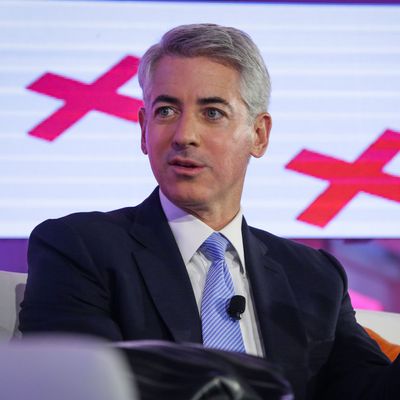
In one of the more surreal events in Bill Ackman’s now almost four-year battle to take down diet-shake seller Herbalife, the New York billionaire found himself in a weathered church in Chicago’s South Side on a bitter January night in 2015.
As the snow fell outside, the hedge-fund titan worked the pews, shaking hands and listening to tales of woe, then stood in front of the sanctuary’s stained-glass windows, where he gave nothing short of a sermon on why Herbalife was a pyramid scheme that was, as he put it, “stealing the American Dream” from new Latino immigrants, who make up the bulk of Herbalife’s U.S. ranks. A spontaneous chant, “Ackman amigo,” sprang from the largely Hispanic crowd.
As the improbable night unfolded, award-winning filmmaker Ted Braun (of Darfur Now fame) was shooting it all — part of a nearly three-year effort that is coming to fruition in Betting on Zero, a documentary about Ackman’s much-debated Herbalife short bet that will have its premiere at the Tribeca Film Festival Thursday.
A wider public lens on the drama could help push regulators to take action on Herbalife, which has been under investigation by the Federal Trade Commission for more than two years. In addition to filming Ackman, director Braun spent months following grassroots activist Julie Contreras, a fierce opponent of Herbalife who invited the hedge-fund manager to speak at the Chicago church and has helped dozens of former sales representatives, called “distributors” or “members” — some of whom appear in the documentary — file complaints with the FTC.
But it’s the six-foot-three, green-eyed, silver-haired Ackman, a made-for-Hollywood hedge-fund legend if ever there was one, who is the main attraction. Whether he’s loved or hated, making money or losing it, Ackman, who turns 50 next month, arguably has more star power than any other money manager of our era. All five showings of Betting on Zero sold out 15 minutes after ticket sales opened.
Off-screen, however, Ackman is being pounded, not only on Herbalife, but also in his even-bigger bet on troubled drug company Valeant Pharmaceuticals. Both companies are facing multiple regulatory investigations over alleged improprieties, not to mention financial pressure. And the shares of both have done the opposite of what Ackman was betting they would do: Valeant has collapsed, while Herbalife is higher than when he announced his short position in 2012.
The two controversial positions helped turn last year into the worst ever for Ackman’s Pershing Square Capital Management. His largest fund was down 20 percent in 2015 and has fallen another 25 percent this year. But even some of Ackman’s harshest critics aren’t counting him out. Hedge-fund manager Robert Chapman of Chapman Capital in Los Angeles, who went up against Ackman on Herbalife in early 2013, has recently invested in both Valeant and Pershing Square Holdings, Ackman’s publicly traded hedge fund. “I don’t think Ackman is ‘done,’ just maimed,” Chapman said in an email. “That dude is RESILIENT!”
Indeed Ackman, has been taking body blows on his Herbalife effort for years. Armed with a mountain of research, he lobbied members of Congress to press the FTC to investigate Herbalife, which the regulator finally agreed to do in 2014 after Latino activists also took up the cause. Since then, Ackman has spent millions on his own investigation, which is continuing, and produced several slick videos, PowerPoint presentations, and two websites tracking his efforts to expose what he believes are Herbalife’s immoral and illegal pyramid practices. Herbalife, he says, preys on the most vulnerable, enticing them into a false business opportunity with promises of riches and health. In the end, the vast majority — about nine out of ten — lose money. The few who do profit, Ackman argues, make the bulk of their income recruiting others into the scheme, which is illegal.

For its part, Herbalife insists it is not a pyramid scheme and has long enjoyed support in Washington, largely from Republican pols like Orrin Hatch of Utah. Since Ackman came along, though, it has spent millions shoring up support on the other side of the aisle. Last year CEO Michael Johnson promised its top salespeople that the company would “seize the narrative,” after hiring Beltway Democrats to beat back Ackman, painting him as a manipulative Wall Street villain out to destroy a company helping solve the global obesity epidemic. (Hillary Clinton’s campaign also has ties to the Herbalife camp: Her surrogates Hilary Rosen and Madeleine Albright are advisers to the company.)
So far, despite the 1,200 alleged victims who have filed complaints with the FTC and other regulators, no action has been taken in the Herbalife matter. (One of them, Julio Ullio, who lost $50,000 and his marriage trying to make a go of it in his Herbalife business, also appears in the film.)
Ackman has hung on, at great financial cost, and remains adamant he will be vindicated. “We do not believe the FTC will deliver a ‘slap on the wrist’ in light of the enormous harm Herbalife inflicts on its victims, which will continue if it is not forced to stop its pyramidal practices,” he told investors in March.
In February, Herbalife said it was in “discussions” with the FTC and warned investors it might be sued by the regulator — which means the FTC could seek an injunction to shut it down, as it has with others. Even if Herbalife does ultimately reach a settlement with the FTC, the question is just how hard the regulator will come down on Herbalife’s controversial business practices. Last year, in a groundbreaking case, the FTC accused an Arizona multilevel marketing company called Vemma of being a pyramid scheme. While the case is winding through federal court, Vemma has been forced to set up a new compensation plan that ensures that most sales are to outside customers — to prove true retail demand instead of recruiting-based pyramid sales. Industry insiders and experts alike believe it is impossible for most MLMs (including Herbalife) to live by that standard.
For Herbalife, the scrutiny has already taken a toll: Net sales fell 10 percent last year, and the distributor ranks are in decline. “The pyramid has quit growing,” says Ackman. The stock has been a stomach-churning roller coaster, with shares still down 25 percent from a high of $81 before the FTC probe began, despite a 45 percent surge over the past 12 months.
The hedge-fund mogul’s jaw-dropping $1 billion short on Herbalife, a 11 percent position, seemed extraordinarily risky when it was unveiled in December of 2012. Short sellers betting on a stock’s decline borrow shares, hoping to pay them back at a lower price and pocket the difference. If the stock rises instead, theoretically the losses are unlimited. Yet taking a huge bet on high-flier Valeant, which once comprised 25 percent of Pershing Square, has proved a bigger black hole — and far more damaging to his reputation.
“We made a number of mistakes on Valeant,” Ackman admitted to investors on his April 6 quarterly call. “It has caused some soul searching.”
Ackman raised the ante for outlandish shareholder activist plays by hooking up with then–Valeant CEO Michael Pearson to press for a takeover of Botox-maker Allergan, where he took a 9 percent stake in the spring of 2014. While that deal fell through, Pershing Square made $2.2 billion on Allergan’s sale to rival drugmaker Actavis, giving his fund an astonishing 40 percent gain that year. Thinking more deals for the acquisitive Valeant were on the horizon, Ackman sold out and reinvested the proceeds in Valeant a year ago. No sooner had he done so than the drugmaker began to gain public notoriety for its hefty price increases on two heart drugs, exposed in The Wall Street Journal last spring, and later mentioned by Clinton as she lambasted the price gouging. (Ackman says he knew nothing about the price hikes until reading it in the newspaper.)
Valeant was already a target of short sellers wary of its acquisition-driven strategy and related accounting practices. Pearson insisted “organic growth” was driving profits. But some of that growth came through a new, secret relationship with captive specialty pharmacy Philidor. When its shady practices were exposed in October, the stock nose-dived, and Valeant ended the relationship.
Ackman was more than a billion dollars in the hole and stuck with the company, even buying more shares to amass a 9 percent stake. This year, however, things took another turn for the worse when Valeant said an internal investigation revealed a $58 million accounting error. Shares are now down 80 percent.
The hedge-fund manager swung into action as his losses mushroomed. In March, he helped kick out Pearson, joined the board, and announced last week that hiring a new CEO could be only “weeks away.” The stock has gained a bit off recent lows. “We should be able to recover the lion’s share of our investment — if not all of it — over time,” he promised.
It has become a popular game on Wall Street to take the other side of Ackman’s bets — especially being long Herbalife and short Valeant — in what has been called a “Schadenfreude” trade. The Street’s denizens are merciless, and some who’ve been on the opposite side of Ackman’s many successes are publicly gloating over his losses and boldly hoping for his demise. “I still have it in for him with Pre Paid Legal,” short seller Marc Cohodes, whose Copper River hedge fund closed down in 2008, wrote in a Twitter exchange with another professed Ackman-hater recently. (Prepaid Legal was popular among short sellers when Ackman was long its stock — some 15 years ago.)
It is easy to go after him. While most hedge funds still shroud their activities and performance in secrecy, Ackman cannot. His holdings are all publicly traded stocks, and his returns have been publicly available ever since the 2014 IPO of Pershing Square Holdings.
Fortunately for Ackman, he has created a moat to protect himself: a fund structure where about half of Pershing Square’s capital is his own or was raised through the IPO, meaning it’s not going anywhere, and the bulk of the rest can only be withdrawn in quarterly intervals over two years. “That setup is brilliant,” says veteran hedge-fund marketing executive Marjorie Kaufman, who also says Ackman has created a “bond of trust” with his investors. Despite the huge losses recently, over the past 11 years he has earned them multiples of what the S&P 500 returned. So far this year, they have asked for only $240 million, or 2 percent, out of the firm’s $12 billion.
To keep investors happy, Ackman now needs to show substantial progress on Valeant. “There’s enormous upside to us if we can recover our value,” he says, knowing that if he succeeds in fixing the company, his stock will rise. On top of that, a movie that flashes the stories of Herbalife’s alleged victims on the big screen could be a godsend for him. Says activist Contreras: “It’s not just about the stock market. People need to see the human aspect.” She, like Ackman, is hoping the FTC is paying attention.





























